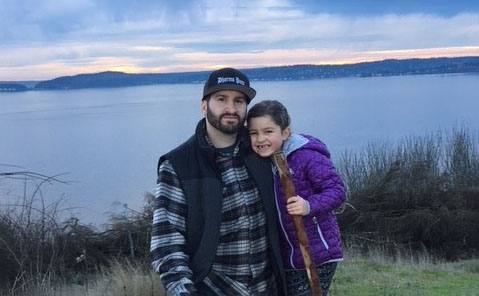
We recently sat down with Joseph Conniff, a treatment provider for people with substance use disorder at Therapeutic Health Services (THS) in Seattle. Joseph struggled with substance use for much of his life and is now in recovery. Because of this unique perspective, we wanted to hear more about his journey with substance use disorder.
Joseph learned from a young age that people self-medicate to deal with the pain. His mother was in an accident a few years before he was born, leaving her with chronic back pain. She was addicted to opioids for as long as Joseph could remember. His father fixed machines in bars – pool tables, poker machines, and arcade games. Joseph frequently went to work with him and was surrounded by people drinking.
Joseph didn’t have a lot of supervision growing up. His only parental guidance was to “make it to school and not get arrested.” He had older siblings and fell into older crowds that were experimenting with drugs and alcohol. He quickly progressed from smoking pot and drinking on the weekends to doing cocaine at 17 years-old. His drug use increased until he was dealing as a way to pay for his habit.
At 19, Joseph joined the Navy, and he took his habits with him. It was easy to access drugs off-base and by the time he was 22, he was kicked out for using cocaine.
The next ten years, 2005 through 2015, Joseph was in a constant drug-seeking state. He eventually moved from cocaine to heroin, smoking $250 of heroin daily. He was constantly loaded and unable to maintain relationships. A good friend died of an overdose in 2007, yet Joseph continued using. He even missed the birth of his daughter.
After ten years, the money finally ran out. In November 2015, Joseph woke up in withdrawal for the first time of his life. This withdrawal helped him realize the depth of his addiction. He wanted to begin medication-assisted treatment but instead spent five months sleeping outside in downtown Seattle – desperately searching more heroin to stave off sickness.
Joseph went through several months of pain-filled cycles of being arrested and unsuccessfully attempting abstinence-based treatment. Eventually, through drug court, he entered a 60-day, in-custody treatment program. Joseph was finally able to recover and has maintained recovery to this day.
Joseph stayed in the loop with drug court as an alum and now works for THS as the resource case manager for clients in drug court. His former counselor is now his supervisor. He reconciled with his daughter and girlfriend, and now they live as a family.
Joseph says the hardest work of his life was being addicted to heroin. “You spend 110% of your time trying not to be sick. Heroin asks you to do things you would never think of. I stole from people. I accidentally broke my girlfriend’s hand. My father was dying and I was still calling my mom for money. I was selfish, and I felt enslaved. Asking people to give up heroin is like asking a drowning person to give air.”
Because of his unique perspective as both a former drug user and a treatment provider, we asked Joseph to share his thoughts on dealing with addiction with us:
Joseph, what do you think is at the root of addiction?
People are in pain. People feel like something’s missing. There’s a lack of connection, whether it’s emotional or physical. Drugs work for a period of time, but eventually, they become just another layer of the problem. You are in bondage to that drug, but it goes deeper than this. You have to look at the systems that cause the pain – the socioeconomic structures like lack of employment opportunities, lack of housing, gentrification, and the emotional and financial stress that these issues cause. People use drugs to try to make life with these realities bearable. It is a coping mechanism.
What do you think of medication-assisted treatment (MAT)?
My perspective for a long time was that medication is a crutch, that it’s trading one drug for another. But I don’t feel that way anymore. The shift happened when I realized just how strong heroin addiction is. Of all the drugs I’ve done, there’s nothing like being addicted to opioids. While I didn’t have access to medications for my own recovery, I think others should.
There’s a difference between addiction to medications and taking them as part of treatment. Addiction asks me to give up everything I own, throw away every relationship, do criminal things, engage in sexually deviant behaviors. Dependence on methadone asks me to go to treatment, head to a clinic, work a job, and get support from a family member. MAT can be the key to rebuilding your life. Recovery is a path, not a destination. And people have different paths.
One-size-fits-all doesn’t work. We’ve lost more people in two years than we did in the Vietnam war. One thing didn’t cause all of this grief, and one thing isn’t going to fix it. It is imperative that we have a variety of different tools and services if we are going to get out of this epidemic. We need to keep every option open; MAT, AA, NA, 12-step, spirituality, meditation, yoga, community, fellowship. What worked for me – NA, meditation, yoga, and family connection – is not going to work for everyone.
Until we can uproot the underlying injustices of our society and make life better for everyone, people will struggle with addiction. It’s up to each person to decide what their recovery looks like.
What do you wish the world knew about people who use heroin?
Leave your biases at the door. Get to know the person, their background, their pain, and have an open mind.
Anybody who is still breathing has a chance at recovery. People in recovery are some of the most productive, resourceful, creative, inspirational people I’ve ever met. Their perspective is invaluable. When you are no longer bonded to heroin, your contribution can be incredible. The people who are going to change this situation in the world are the people who know it from the inside.




